Avoid These 7 Winter Health Risks
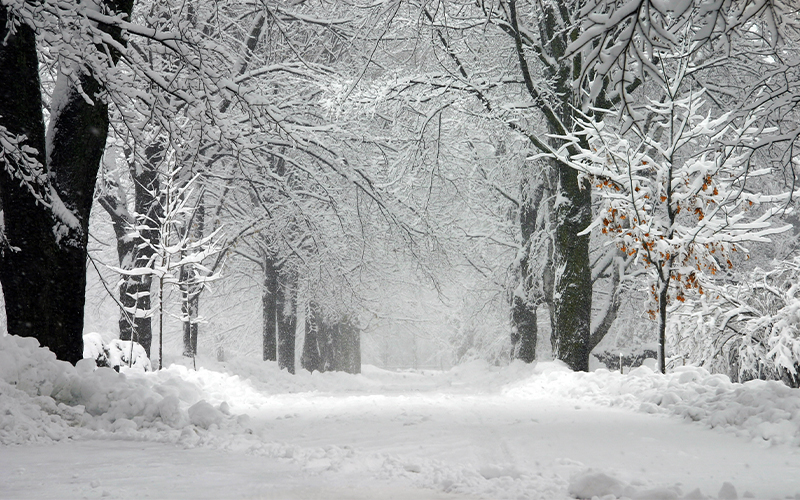
Slips and Falls
Fall-related injuries are one of the top adult trauma injuries seen at Munson hospitals across Northern Michigan in wintertime. Slippery ice, high snowfall, and leftover slush can quickly lead to broken bones and serious head injuries that can have life-changing consequences. The good news is that outdoor slips, trips, and falls aren’t inevitable. Practice these simple, yet effective expert tips to keep your balance and stay safe:
-
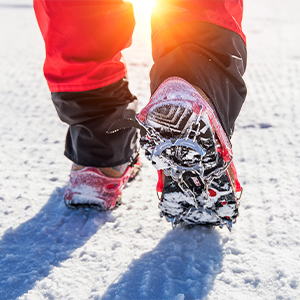
- Widen your stance and “walk like a penguin” with a slight bend, relaxed knees, and slow steps.
- Give yourself extra time when walking to and from appointments and activities.
- Keep your hands free (using a backpack, for example) with your phone tucked away. Now you’ll be solely focused on walking, with your arms free to help regain balance if needed.
- Be prepared to fall. If you start to slip and can’t balance yourself, relax your muscles and fall on your side. Try to avoid landing on your hands, knees, or back.
- When parking, open your vehicle door and make sure your parking area is free of ice before stepping out of your vehicle. Don’t hesitate to find a safer parking spot if you need to – and use your vehicle for support to assist you as you climb in and out.
- Ask for help with snow removal – especially if you intend to use a ladder.
Cardiovascular Events Due to Snow Removal
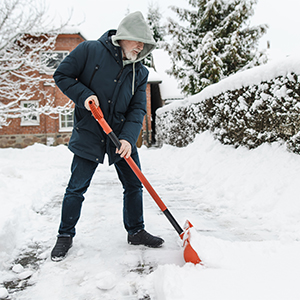
Clearing snow from your driveway might not seem like exercise in the traditional sense, but shoveling or operating a snow blower can quickly strain your heart. The combination of cold temperatures and a sudden increase in heart rate due to physical exertion can lead to a heart attack or a sudden cardiac event – especially for people who don’t exercise regularly.
In fact, research shows that for men, heavy snowfall is linked not just to an increase in heart attack-related hospital admissions, but a 34 percent increase in heart attack deaths.
“During the winter, there are increased hospitalizations for heart attacks and other cardiac events. Clearing snow by shoveling or with a snow-blower is an activity requiring high levels of exertion and can be more stressful on the heart than what many people are accustomed to,” says interventional cardiologist Joseph Gibbs, MD, of Munson’s Traverse Heart & Vascular. “I recommend people use caution during these activities.”
“People with cardiovascular risks or a history of heart attack or stroke should pay attention to symptoms such as chest pressure or heaviness, difficulty breathing or lightheadedness. Remember to take frequent breaks and focus on pushing the snow rather than lifting it,” adds Traverse Heart & Vascular Interventional Cardiologist Prasanthi Yelavarthy, MD.
Cardiovascular risks include:
- Being a current or former smoker
- Living with diabetes
- Having high blood pressure or cholesterol
- Living a sedentary, non-active lifestyle
Respiratory Illness
Winter is the season for snow.... and sickness. While respiratory viruses like the seasonal flu, RSV, and COVID-19 can be prevented through vaccines, frequent handwashing, and limiting contact with sick people, if you do get sick, unaddressed respiratory illnesses can lead to more dangerous complications that can require hospitalization.
If you’re experiencing symptoms that feel more than mild, it’s important to seek expert help right away to help with treatment options, which vary depending on your diagnosis. If your primary care provider isn’t available, Munson Healthcare’s Virtual Urgent Care can help, right from the comfort of home. Not sure what to do? Call our free Ask-A-Nurse line at any time, seven days a week. Finally, always call 9-1-1 if you or a loved one has any emergency symptoms.
Winter Sports Injuries
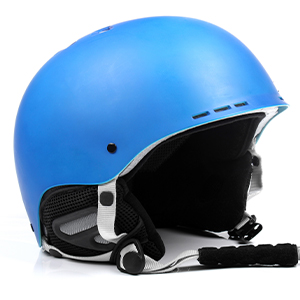
“Helmets drastically reduce the risk of head trauma and serious injury,” says Sarah Helveston, RN, Trauma Program Manager for Munson Medical Center.
For children still growing, it’s especially important to make sure they have a properly fitting helmet for the season – and to teach and reinforce the rules of the slopes. The Munson-sponsored Chill Out for Winter Safety Program can help your child learn and remember the four rules of winter sports, and free helmet clinics are offered throughout our region, which include helmet fittings, appearances by Chill Out mascot Beary Careful, and free kids’ helmets.
Hypothermia and Frostbite
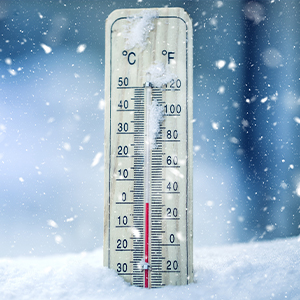
Like hypothermia, frostbite is also caused by cold-weather exposure. Frostbite is the most common injury from cold exposure and can damage tissues underneath the skin to the point that amputation is necessary.
Protect yourself from hypothermia and frostbite by always adhering to the following:
- Dress in warm layers
- Don’t forget hats, gloves or mittens, and water-resistant boots
- Don’t stay outside in clothing that is damp or wet
- Give yourself frequent breaks indoors
Seasonal Affective Disorder (SAD)

Motor Vehicle Accidents
Car and snowmobile-related accidents both rank as top injuries during the winter season. Driving any motor vehicle during inclement weather – including those made for snow recreation – can put your safety at risk. If you can, avoid driving in hazardous conditions, which can dramatically decrease your risk of an accident. When you do travel, give yourself extra time so you can do the following:
-
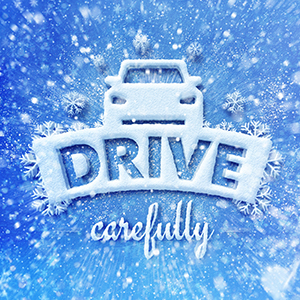
- Take it slow
- Watch for reckless drivers
- Maintain your distance from other vehicles
- Increase your stopping distance
- Be extra cautious when navigating curves and bridges
As for snowmobiles, remember that while these off-road vehicles are built for cruising the snow, safe snowmobiling depends largely on the driver. This includes precautions that any driver should take, including obeying speed limits, watching weather conditions before heading out, and avoiding alcohol.
“An overwhelming number of injuries seen by our trauma departments occur when alcohol is involved,” says Helveston.
Alcohol is a leading cause of snowmobile-related deaths and injuries, and about one-third of car fatalities involve alcohol-impaired drivers, according to the National Highway Traffic Safety Administration (NHTSA).